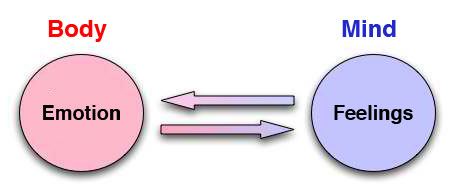| Online: | |
| Visits: | |
| Stories: |

| Story Views | |
| Now: | |
| Last Hour: | |
| Last 24 Hours: | |
| Total: | |
Understanding the Difference Between Emotions and Feelings – and Why It Matters
24th April 2015
By Debbie Hampton
Guest Writer for Wake Up World
Although feelings and emotions are two sides of the same coin, they are very distinct events and understanding the difference can help you increase your emotional intelligence and happiness.
Emotions originate in the subcortical regions of the brain, the amygdala and the ventromedial prefrontal cortices, and create biochemical reactions in the body altering your physical state which originally helped our species survive by producing quick reactions to threats and rewards. Emotional reactions are coded in our genes and are universally similar across all humans and even other species. For example, you smile and your dog wags its tail.
The amygdala, involved in emotional arousal, also regulate the release of neurotransmitters essential for memory consolidation which is why emotional memories can be so strong and long-lasting. Emotions proceed feelings, are physical, and instinctual. Because they’re physical, emotions can be objectively measured by blood flow, brain activity, facial micro-expressions, and body language.
Feelings originate in the neocortical regions of the brain, are mental associations and reactions to emotions, and are subjectively influenced by personal experience, beliefs, and memories. A feeling is the mental portrayal of what’s going on in your body when you have an emotion, and is the byproduct of your brain perceiving and assigning meaning to the emotion. Feelings follow emotion, involve cognitive input, are usually below conscious awareness, and cannot be measured scientifically.
Antonio D’Amasio, professor of neuroscience at The University of California and author of several books on the subject, explains it as:
Feelings are mental experiences of body states, which arise as the brain interprets emotions, themselves physical states arising from the body’s responses to external stimuli. (The order of such events is: I am threatened, experience fear, and feel horror.)
Dr. Sarah Mckay, neuroscientist and author of the Your Brain Health blog explains it as:
Emotions play out in the theater of the body. Feelings play out in the theater of the mind.
Feelings are sparked by emotions and colored by thoughts, memories, and images that have become subconsciously linked with that particular emotion for you. But it works the other way around too. For example, just thinking about something threatening can trigger an emotional fear response. While individual emotions are temporary and in response to specific events, the feelings they evoke may persist and grow over time. Because emotions cause subconscious feelings which in turn initiate emotions and so on, your life can become a never-ending cycle of painful and confusing emotions which produce negative feelings which cause more negative emotions without you ever really knowing why.
While basic emotions are instinctual and common to us all, the meanings they take on and the feelings they prompt are individual based on our programming and experiences. Feelings depend on person’s temperament and past learning and vary greatly from person to person and situation to situation.
Your emotions and feelings play a powerful role in how you experience and interact with the world because they are the driving force behind many of your behaviors, both helpful and unhelpful. It’s possible to react to emotions and the feelings they evoke which are guided by unconscious fear-based perceptions which you may not buy into anymore, yet you’re living your life, making decision and behaving according to these out-dated tendencies. Living unaware like this almost always leads to problems and unhappiness.
Follow Wake Up World On…
[FACEBOOK]: http://www.facebook.com/joinwakeupworld (An interactive community of over 2,000,000)
[PINTEREST]: http://pinterest.com/wakeupword/
[TWITTER]: http://twitter.com/joinwakeupworld
[YOUTUBE]: http://www.youtube.com/joinwakeupworld
[GOOGLE PLUS]: https://plus.google.com/112452105795129310867/posts
[WEBSITE]: http://wakeup-world.com







I think a good concise definition of emotion is; an internal chemical reaction to a subjectively perceived external stimuli. I’ve always considered feelings to be physical in nature, eg tired, energised, ill, healthy, fit, lazy, sexy, etc.